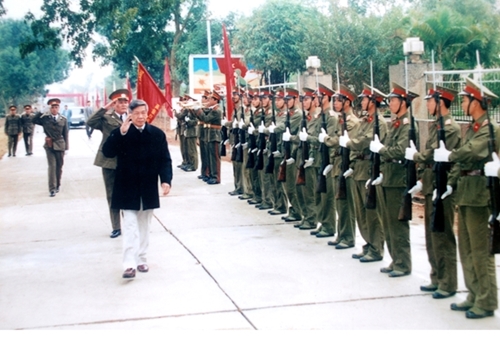The army corps witnessed Senior Lieutenant General Le Kha Phieu starting his military career as a soldier, making feats of arms in the war against American invaders and holding various commanding positions during more than 20 years of his service in the unit.
    |
 |
|
Former Party General Secretary Le Kha Phieu visited Division 304 on February 27, 2000. (A photo from archives) |
On May 1, 1950, Mr. Le Kha Phieu joined the army and he was posted to Regiment 66, Division 304 or Vinh Quang Unit (one of the precedents of current Army Corps 2). From 1954 to 1958, he was appointed as company commander and then the Chief of the Political Office of Regiment 9, Division 304.
From 1965 – 1968, he held various leading positions, including the Commissar of the regiment. Especially, when the Commander of Regiment 9 died during a battle in Hue city in January 1968, Mr. Le Kha Phieu held the two highest positions at Regiment 9: Commissar and Commanding Officer.
According to war veterans who used to fight side by side with Mr. Le Kha Phieu in the past war, he was a talented leader. They all said Mr. Le Kha Phieu had a brilliant mind and he was a far-sighted, resourceful and decisive leader. They recalled, after winning big victories in central Laos in 1965, Mr. Le Kha Phieu convened key officers of the regiment to draw lessons from the battle. He said, “Although we have obtained an important victory, we still made mistakes during the operation. We should seriously discuss, analyze and learn from our mistakes so as to win more victories in the future.”
When Army Corps 2 was founded on May 17, 1954, Mr. Le Kha Phieu was the Chief of Political Agency of the army corps. In his capacity, Mr. Le Kha Phieu attached importance to conducting political education for troops as well as taking care of both spiritual and material lives of troops. Although he was a senior leader, he often met and talked with junior officers and soldiers. According to him, a political leader of a unit should be close to his subordinates to understand their difficulties at work and in life so as to encourage them and support them to overcome the difficulties and complete their assignments.
Mr. Le Kha Phieu was always present at the fiercest combat points, and became a source of encouragement for combatants on battlefields.
As a political leader, Mr. Le Kha Phieu often instructed his subordinates to attach much importance to cementing a close-knit relationship with the people. Following Uncle Ho’s teaching “Based on the people,” Mr. Le Kha Phieu took every opportunity to conduct mass mobilization activities for the people in localities where the unit was stationed and even during the unit’s operations. As a result, when the army corps was ordered to quickly move southward to liberate Saigon, it received much support from the local people. Local people volunteered to be conscripted laborers, and provided the unit with material and spiritual supports.
So it can be said that Mr. Le Kha Phieu was a great political officer, who laid foundations for Party and political work of Army Corps 2.
Later when he held higher positions in the military and Party, Mr. Le Kha Phieu visited Army Corps 2 and its subunits several times. On March 10, 1995, he visited Division 304, he had meetings with soldiers and asked them to further promote the glorious tradition of the unit and contribute to the development of the unit.
In 2000, as the Party General Secretary, Mr. Le Kha Phieu visited Army Corps 2. He instructed the leadership to continuously improve the quality of training, enhance political education for its officers and the ranks and build Army Corps 2 as a revolutionary, regular, elite and gradually modernized unit, deserving to be a main mobile army corps of the Vietnam People’s Army.
With their deep regret about the decease of the former leader of the Party and Army, all officers and soldiers of Army Corps 2 commit themselves to studying and following Mr. Le Kha Phieu’s moral example and working style, overcoming all difficulties and completing all assigned tasks.
Written by Commissar of Army Corps 2 Major General Do Xuan Tung
Translated by Thu Nguyen